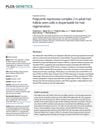Genome-Wide Maps of Histone Modifications Unwind In Vivo Chromatin States of the Hair Follicle Lineage
September 2011
in “
Cell stem cell
”

TLDR Hair follicle stem cells use specific chromatin changes to control their growth and differentiation.
The study investigated how hair follicle stem cells (HF-SCs) in mouse skin remodel chromatin in response to activation cues, focusing on the role of polycomb-group (PcG)-mediated H3K27-trimethylation. It was found that PcG represses nonskin lineages and HF differentiation in HF-SCs, while in their transit-amplifying (TA) progeny, nonskin regulators remain repressed, HF-SC regulators gain H3K27me3 marks, and HF-lineage regulators lose them. This chromatin mapping revealed how HF-SCs maintain their stemness through cycles of quiescence and activation, highlighting the importance of PcG-mediated repression in the irreversible fate switch of these cells.











